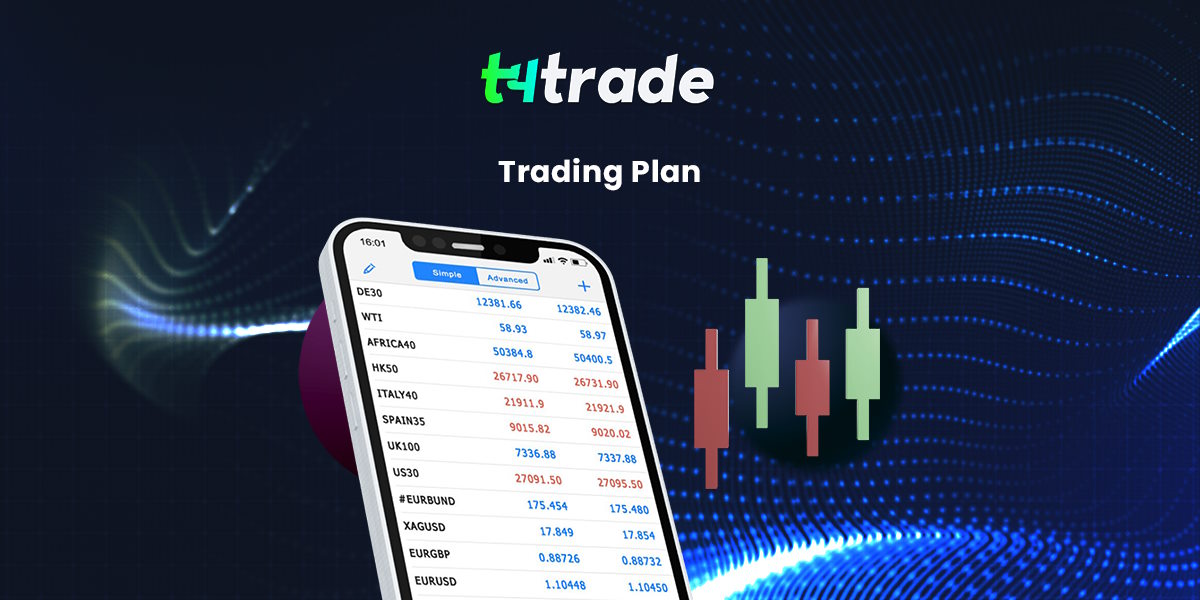“If you fail to plan, then you’ve already planned to fail,” the saying goes and perhaps it is very true about trading too. A trading plan is every trader’s essential tool in navigating the markets as it defines your strategy, when, how and why you will take action, as well as your personality and expectations, risk management rules, and trading system. When you follow your trading plan and remain disciplined, you will potentially be more capable in limiting your mistakes and minimising your losses. A clear and solid plan will help you avoid making bad decisions and take a more rational attitude towards trading. When trading, your emotions can take over and cause you to make irrational decisions that may cost you your hard-earned money. You don’t want to risk your funds just because you made a bad decision as this can consume you when money is on the line, causing you to make irrational decisions. You don’t want that to happen.

Developing a Trading Plan
Creating your own trading plan and sticking to it are two important factors that you should not take lightly. Being disciplined and organised will help you find the success in the long term, so don’t underestimate the importance of having a clear action plan.
A trading plan or a trading system?
A trading system is part of your trading plan and determines how you will enter and exit trades. The trading plan is the overall, let’s say, map of how you will trade, which includes your trading system, analysis, executions and risk management, to name a few. With markets constantly changing, your trading plan should include more than one trading system to respond to the changing market conditions.
Trading plan basic structure
What sometimes traders ignore is the fact that having a trading plan can mean the difference between making money and losing money. A trading plan is a structured approach to executing a trading system that each trader has developed, considering their specific market analysis and outlook while also including risk management techniques and their own personal psychology. Below are a few pointers to consider when developing your own trading plan.
Trading strategy
A trading strategy should contain at least the below:
- Reasons for entering a trade
- Rules for taking profit
- Rules for exiting a trade at a loss
Managing risk
Another important part of your trading plan is how you will manage risk. Below are at least 3 questions to consider:
- What’s your minimum risk/reward ratio?
- How much of your account can you afford to risk per trade?
- What is the maximum you can afford to lose?
Keeping records
It is good to keep records, evaluate your daily routine and adapt. Here are a few more things to have in mind:
- Daily routine
- Your charts set-up
- Keeping a journal, recording your progress or mistakes & trying to improve your trading
For your trading plan to work, you first need to follow it. Developing a great trading plan is not enough. Forex traders who follow a trading plan and exercise discipline are usually the ones who make it to the next year and develop their skills consistently.
Why have a trading plan?
- Reduces stress and prevent irrational behaviour
- Helps you evaluate your performance, identify problems, and make corrections.
- Reduces the number of mistakes and bad trades
- Helps you remain in control
- Provides discipline
- Will help you go after consistent profits
- A trading plan will help you recognise mistakes quickly and correct them
A trading plan is not a finite work, but a work in progress. Since the market environment is dynamic and constantly changing, then your trading plan should also change too.
Adapting your trading plan
You should always identify any areas to correct or improve and continuously assess your trading plan. As you learn more and as the market environment changes, your trading system should reflect those changes. You should constantly adapt your trading plan and operate in a manner that is effective.
Making consistent profits
While there is no correct trading plan that will guarantee you profits, having one will definitely provide a guide and help you understand whether you are heading towards the right direction. A trading plan will provide the basis to measure your trading performance, and as you continue, you should be able to monitor this and make changes, without emotion or stress.
Find out what works, and what needs to be abandoned, test, repeat and adjust. There is no reason to trade recklessly as having no trading plan will keep you stressed and on edge.
As many traders have said many times, if you are trading without a plan, or not sticking to your plan, you will very early find out. If you don’t know what you’re doing or cannot tell what is right or wrong, then you possibly need to sit down and develop your own trading plan. Trading on hunches or relying on the advice of strangers will soon prove to be a mistake and you will never have the opportunity to make consistent money as a trader. By not taking any chances and having a trading plan, will get you on the right path.
Trading with T4Trade
T4Trade has a wide range of free educational resources to help you delve into the markets and support you when conducting fundamental and technical analysis. From webinars to podcasts, video on demand, as well as Live TV and eBooks, you can get ahead of the markets and organise your trades based on valuable information. A multilingual customer support team is always available to provide support and help with opening an account and getting started.











